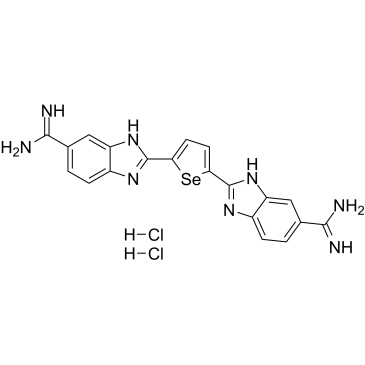DB1976 hydrochloride
Modify Date: 2024-01-16 10:58:16

DB1976 hydrochloride structure
|
Common Name | DB1976 hydrochloride | ||
|---|---|---|---|---|
| CAS Number | 2369663-93-2 | Molecular Weight | 520.28 | |
| Density | N/A | Boiling Point | N/A | |
| Molecular Formula | C20H18Cl2N8Se | Melting Point | N/A | |
| MSDS | N/A | Flash Point | N/A | |
Use of DB1976 hydrochlorideDB1976 hydrochloride is a selenophene analog of DB270 and a potent and cell-permeable fully efficacious transcription factor PU.1 inhibitor. DB1976 hydrochloride potently inhibits PU.1 binding (IC50 of 10 nM) and strongly inhibits the PU.1/DNA complex (with high DB1976-λB affinity, KD of 12 nM) in vitro. DB1976 hydrochloride has apoptosis-inducing effect[1][2][3]. |
| Name | DB1976 hydrochloride |
|---|
| Description | DB1976 hydrochloride is a selenophene analog of DB270 and a potent and cell-permeable fully efficacious transcription factor PU.1 inhibitor. DB1976 hydrochloride potently inhibits PU.1 binding (IC50 of 10 nM) and strongly inhibits the PU.1/DNA complex (with high DB1976-λB affinity, KD of 12 nM) in vitro. DB1976 hydrochloride has apoptosis-inducing effect[1][2][3]. |
|---|---|
| Related Catalog | |
| Target |
IC50: 10 nM (Transcription factor PU.1)[1] |
| In Vitro | DB1976 is a classic heterocyclic dication (a single heteroatom) with strong affinity and selectivity for AT-rich sequences commonly found in cognate DNA binding sites for PU.1[2]. DB1976 inhibits PU.1-dependent transactivation of the reporter in a dose-dependent manner with an IC50 value of 2.4 μM in PU.1-negative HEK293 cells[3]. DB1976 treatment leads to a profound decrease in the growth of PU.1 URE–/– AML cells (IC50 of 105 μM), while showing little effect on normal hematopoietic cells at similar concentrations (IC50 of 334 μM)[3]. DB1976 treatment leads to a 1.6-fold increase in apoptotic cells in murine PU.1 URE–/– AML cells, and observed similar effects in human MOLM13 cells[3]. DB1976 treatment leads to a significant decrease in the number of viable cells (primary human AML cells) (mean decrease of 81%) and clonogenic capacity (mean decrease of 36%) compared with vehicle-treated cells. The apoptotic cell fraction increased on average by 1.5-fold with DB1976[3]. |
| References |
| Molecular Formula | C20H18Cl2N8Se |
|---|---|
| Molecular Weight | 520.28 |